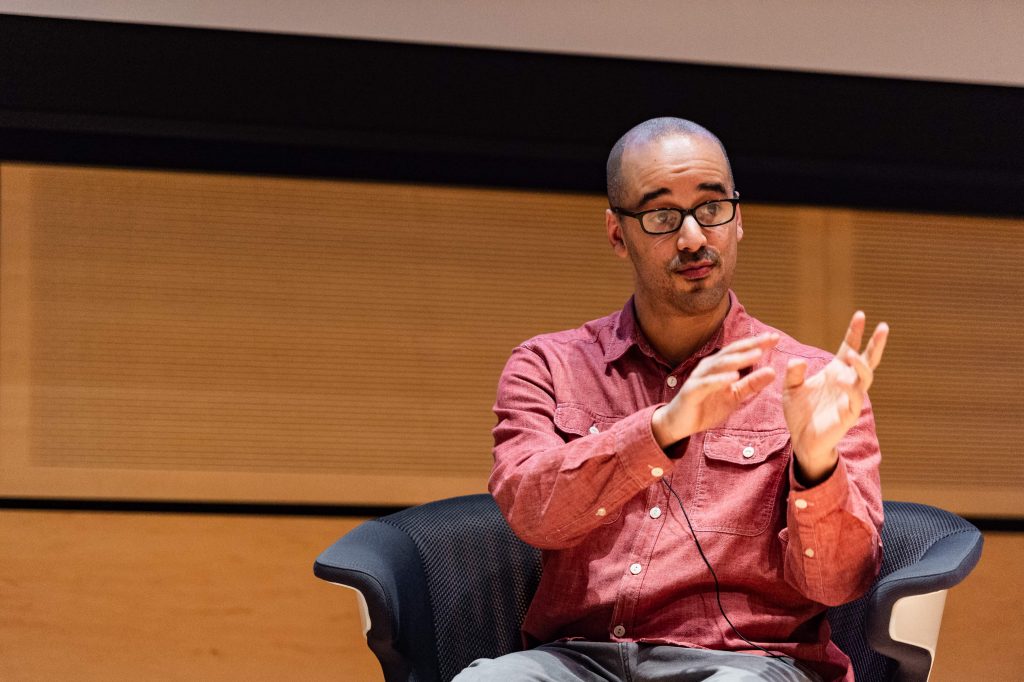Jay Smooth reflects on social justice and call-out culture
Jay Smooth reflects on social justice and call-out culture

Phi Sigma Pi, the Student African American Society and the Office of Interim Chief Diversity Officer Keith Alford teamed up to host “An evening with Jay Smooth,” on April 22 in the Joyce Hergenhan Auditorium. A hip-hop DJ and cultural commentator, Smooth is also the former host of New York City’s longest running hip-hop radio program, the Underground Railroad.
Alford introduced Jay Smooth with some opening remarks before members of the hosting organizations welcomed Smooth. “There have been a number of incidents here on this campus that have shown more than ever that this is the discussion that we all need to have,” said Ja’el Jones, president of the Student African American Society. “As a Syracuse University student as well as a student of color, this is a topic of importance to me.”
Phi Sigma Pi diversity and inclusion co-chair Alex Tsemberis explained their mission statement of promoting “a culture based on the acceptance, respect, and embracement of all different identities, attributes, and values” and thanked the administration for making SU a better place for everyone. “Dr. Alford, without you none of this is possible,” Tsemberis said. “Your exceptional work every day to make sure that each and every one of our 22,000 students feels accepted and at home at Syracuse University does not go unnoticed.”
Smooth told the audience about his own upbringing and how it intersected with hip-hop and racism. He explained that he identified as black but that his mixed racial identity was confusing to people and that he often felt isolated by his white peers. “Discovering the world of hip-hop and being embraced by New York’s Underground hip-hop community when I started the show in ’91 gave me a sense of having somewhere to belong in the world and having something bigger than myself to be a part of,” Smooth said.
He discussed and showed the audience his video blog, Ill Doctrine, where he talks about social justice and race.
“It made me attuned to how arbitrary and irrational and disconnected from any science or logic our relationship with race is, while also being a real construct that we have to live with and figure out how to navigate,” Smooth said.
Smooth talked growing up in Harlem and the origins of hip-hop in the 1970s in the South Bronx, the poorest district in the United States at one point. “In its best moments, that tradition of helping oppressed people carve out space for the community where we can be seen and heard is what I love most about hip-hop and what I try to take with me from hip-hop into all my other work,” he said.
Smooth also the audience about lessons he learned from hip-hop that he tries to apply to everyday life and his work educating people about racial inequality. One of the struggles he still faces is having a conversation with someone you care about who is doing something you don’t agree with.
“Challenging each other within a culture as a way to make each other better is in many other forms what hip-hop traditions are built upon,” Smooth said.
He also talked about how no one is perfect and that we all have prejudices. He said the key is to recognize them and not make character judgments about people because they said or did something racist.
“A crucial understanding that I think we all need to have is shifting our understanding of goodness as sort of an immutable state of being,” Smooth said, “and instead understanding goodness as a practice that you cultivate every day, just like we brush our teeth.”
Smooth emphasized that anger and the call-out culture are important aspects, but so are boundaries and self-care, although it can be tricky to decide between the two.
“Should we lead with compassion, or should we prioritize resistance? It’s a big question right now,” Smooth said.
Smooth’s remarks were followed by questions from the organizations that set up the discussion, including Phi Sigma Pi diversity co-chairs Tsemberis and Maris Rodriguez-Torres as well as Jones.
Tsemberis asked Smooth for his advice on working with systems like Syracuse University when progress seems slow.
Smooth said he was still trying to figure that out, but that students should speak and act out even when it doesn’t seem to be working.
“We plant seeds as we keep repeating,” Smooth said. “You can put ideas into people’s heads that years later they’re going to come around to a different understanding because of that seed you planted.”
In the last part of the event, Smooth took questions from the audience.
A question was asked about how students should have open discussions with the university administration about systemic racism in university incidents, like the racially-motivated attack on Ackerman Ave. this semester that the Department of Public Safety and SU would not say was race-based.
Smooth suggested that students first make an appeal, work their way up the administration chain if no one will listen, and bring in outside police, alumni and faculty to voice the concern.
“Whoever you can bring in to bring more scrutiny and pressure is going to be your best shot to get it done,” Smooth said.
One question was about overstepping boundaries when talking about race and how to be an ally. Smooth suggested that allies of minorities prioritize listening above everything and that they should ask them how they want their experience talked about and stood up for. He also suggested that allies not make themselves the center and to be more of a supportive role.
“You’re always on your first day of the job as an ally, learning how to do the next right thing and figuring out how you fit into this and being humble,” Smooth said.





